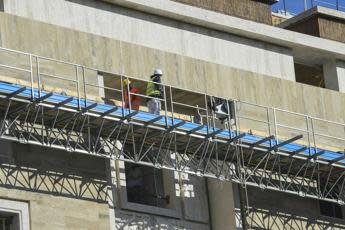Superbonus 110% without reporting the expense in the tax return? Attention, because if you choose the credit transfer or the discount on the invoice you will first have to deal with the Revenue Agency. To explain what could happen when the taxman decides to block payments are the experts of the legal information site The law for all.
The changes to the legislation, they explain, “provide for preventive checks that could ruin all the benefits in the event that there was something unclear. A mechanism, to tell the truth, still imperfect but in any case in function as regards the 110% super bonus: so the tax authorities can block payments or, after a few years, knock on the taxpayer’s door to ask him to repay non-existent credits. Obviously, with interest “.
What to do then? “There are three possibilities to recover the expense related to the works that fall within the 110% superbonus: to deduct the expense – in this case, through the tax return, the money is recovered in a maximum of five annual installments of the same amount – ; the transfer of the tax credit; the discount on the invoice. On the first option, the control takes place as for any other tax deduction (restructuring, eco-bonus, health expenses, etc.). The other two are those on which the Agenzia delle Entrate wants to see clear immediately “, those presumably chosen by” those who do not have the money to advance for the energy improvement work of their property that entitles the 110% superbonus or those who do not want to wait five years to recover all the spending through the tax return “.
Both for the assignment of the tax credit and for the discount on the invoice, it is necessary to “electronically transmit to Enea the declarations issued on the interventions (procedure that must be carried out by the qualified technician who signed the compliance visa); the taxpayer must, then, communicate his choice to the Revenue Agency using a form to be sent on the Agency’s online platform by March 31 of the year following the one in which the work was paid. Those who receive the tax credit can check through their tax drawer if it has been paid and must confirm whether it accepts or refuses it. This communication is also mandatory for any other future transfers. experts – which can allow the tax authorities to block payments relating to the 110% superbonus, or rather to prevent the taxpayer from accessing the benefit “.
The Revenue Agency, once it has received the communication relating to the credit transfer or the discount on the invoice, has in fact “the right to check the correctness of the data reported and the right of the taxpayer to obtain the super bonus. warns that it is a risk profile, the Agency can suspend the effects of the assignment and any subsequent ones for up to 30 days. In practice, it blocks the assignment of credit which would be like blocking the facilitated payment of the works “.
When can the tax authorities decide when faced with a risk profile? The law for all explains: “The following elements must be assessed, among others: the consistency and regularity between the data indicated in the communication and those resulting from the tax registry; data concerning the assignment of the tax credit and the subjects involved in the transaction; the progress and regularity of any previous transfers made by the same taxpayer “and if” during the checks the irregularities are confirmed or there are elements to argue that the person requesting the sale or discount is a profile at risk, the Tax Authority believes the communication has not been made. In practice, everything skips. The taxpayer who sent the communication to the Agency is always notified of this circumstance. If, on the other hand, everything goes smoothly during the checks or 30 days from the date of dispatch of the communication have elapsed without the Agency having made itself heard, the assignment of the credit or the discount on the invoice becomes fully effective “, under lineano.
Then the invitation of the experts to be “careful because the fact that you have been given the go-ahead for the transfer of credit or the discount on the invoice relating to the 110% superbonus does not mean being able to throw away the documentation. The Inland Revenue can make its own control activities both by virtue of the powers provided for direct taxes and for the recovery of the sums of which the taxpayer has unjustly obtained a benefit (plus penalties and interest, of course). This means that the Tax Authority can proceed with an act of recovery which must be notified by 31 December of the fifth year following the one in which the violation of the rules took place. This is, in practice, the term normally envisaged for the recovery of unpaid credits (and not for non-existent credits, for which the notification can go up to the end of the eighth year following the violation.) In essence, those who have unlawfully taken advantage of the benefit in 2022 can receive notification of The recovery deed by 31 December 2027 “.
–


